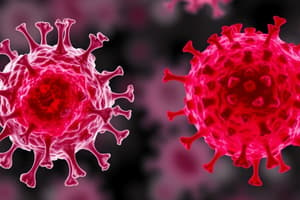Podcast
Questions and Answers
What is the primary function of the Major Histocompatibility Complex (MHC)?
What is the primary function of the Major Histocompatibility Complex (MHC)?
- To transport oxygen in the blood
- To degrade proteins within cells
- To facilitate cell division
- To present antigenic peptides to T cells (correct)
In which situation would the Human Leukocyte Antigen (HLA) be critical?
In which situation would the Human Leukocyte Antigen (HLA) be critical?
- During a bacterial infection
- For blood clotting
- In muscle contraction
- In solid organ transplantation (correct)
What determines the ability of a T cell to recognize an antigen?
What determines the ability of a T cell to recognize an antigen?
- The size of the peptide
- The combination of MHC and peptide structure (correct)
- The location of the antigen in the body
- The presence of antibodies
Which class of MHC molecules typically presents antigens to CD4+ T helper cells?
Which class of MHC molecules typically presents antigens to CD4+ T helper cells?
What is the significance of allelic variation in HLA genes?
What is the significance of allelic variation in HLA genes?
Which statement best describes the antigen processing pathway associated with MHC Class I molecules?
Which statement best describes the antigen processing pathway associated with MHC Class I molecules?
What happens when the T cell receptor (TCR) recognizes an Ag:MHC complex?
What happens when the T cell receptor (TCR) recognizes an Ag:MHC complex?
Which gene products are associated with the Human Leukocyte Antigen (HLA) system?
Which gene products are associated with the Human Leukocyte Antigen (HLA) system?
What domain of MHC Class I molecules primarily undergoes allelic variation?
What domain of MHC Class I molecules primarily undergoes allelic variation?
What is the role of the invariant chain in MHC Class II molecules?
What is the role of the invariant chain in MHC Class II molecules?
How does allelic variation in HLA molecules relate to clinical outcomes?
How does allelic variation in HLA molecules relate to clinical outcomes?
Which process does the proteasome primarily contribute to in the MHC Class I pathway?
Which process does the proteasome primarily contribute to in the MHC Class I pathway?
What distinguishes the peptide binding between MHC Class I and Class II molecules?
What distinguishes the peptide binding between MHC Class I and Class II molecules?
Which of the following is NOT a step in the formation of MHC Class II molecules?
Which of the following is NOT a step in the formation of MHC Class II molecules?
Which statement best describes the effect of anchor residues in MHC Class I molecules?
Which statement best describes the effect of anchor residues in MHC Class I molecules?
What differentiates HLA-A1 from HLA-A28 in terms of functionality?
What differentiates HLA-A1 from HLA-A28 in terms of functionality?
Which of the following statements about HLA class I genes is correct?
Which of the following statements about HLA class I genes is correct?
What does a child inherit in terms of HLA haplotypes from parents?
What does a child inherit in terms of HLA haplotypes from parents?
Which cytokine is known to induce HLA class II expression on non-professional antigen-presenting cells?
Which cytokine is known to induce HLA class II expression on non-professional antigen-presenting cells?
What is the significance of polymorphism in MHC genes?
What is the significance of polymorphism in MHC genes?
Which of the following combinations is considered a characteristic of HLA class II genes?
Which of the following combinations is considered a characteristic of HLA class II genes?
What is a key distinguishing feature of beta2 microglobulin (β2m) in the context of MHC?
What is a key distinguishing feature of beta2 microglobulin (β2m) in the context of MHC?
What is the probability of two siblings sharing HLA identity?
What is the probability of two siblings sharing HLA identity?
Which concept best describes the term 'allele' in the context of MHC genes?
Which concept best describes the term 'allele' in the context of MHC genes?
Flashcards
HLA genes
HLA genes
Genes that influence immune system diversity and disease association.
HLA-haplotypes
HLA-haplotypes
Sets of HLA genes inherited together from parents.
HLA identity sharing
HLA identity sharing
The likelihood of two individuals sharing the same HLA genes.
HLA class I genes
HLA class I genes
Signup and view all the flashcards
HLA class II genes
HLA class II genes
Signup and view all the flashcards
MHC genes polymorphism
MHC genes polymorphism
Signup and view all the flashcards
MHC genes - polygenic
MHC genes - polygenic
Signup and view all the flashcards
MHC genes - polymorphic
MHC genes - polymorphic
Signup and view all the flashcards
MHC role in antigen presentation
MHC role in antigen presentation
Signup and view all the flashcards
Antigen Presentation Process
Antigen Presentation Process
Signup and view all the flashcards
T cell recognition
T cell recognition
Signup and view all the flashcards
MHC Class I
MHC Class I
Signup and view all the flashcards
MHC Class II
MHC Class II
Signup and view all the flashcards
HLA
HLA
Signup and view all the flashcards
MHC and Transplant Rejection
MHC and Transplant Rejection
Signup and view all the flashcards
T Cell Receptor (TCR)
T Cell Receptor (TCR)
Signup and view all the flashcards
HLA-B gene alleles
HLA-B gene alleles
Signup and view all the flashcards
MHC Class I molecules
MHC Class I molecules
Signup and view all the flashcards
MHC Class II molecules
MHC Class II molecules
Signup and view all the flashcards
Peptide Binding (MHC)
Peptide Binding (MHC)
Signup and view all the flashcards
Proteasome
Proteasome
Signup and view all the flashcards
Antigen processing
Antigen processing
Signup and view all the flashcards
Class I MHC processing
Class I MHC processing
Signup and view all the flashcards
Class II MHC processing
Class II MHC processing
Signup and view all the flashcards
Study Notes
Major Histocompatibility Complex (MHC) in Antigen Presentation
- MHC genes code for Human Leukocyte Antigens (HLA)
- HLA class I and class II genes differ structurally and functionally
- HLA class I and class II molecules process and present antigens differently
- HLA class I and II genes are expressed on different cell types
- HLA polymorphism influences disease susceptibility and transplant rejection
- MHC proteins are co-dominantly expressed
The MHC as a Cell Surface Protein
- MHC is a cell surface protein binding antigenic peptides
- MHC proteins present peptides to T cells
- Proteins are degraded by the Antigen-Presenting Cell (APC) or any cell
- Peptides associate with MHC molecules
- MHC-peptide complex is expressed on the cell surface
- A T cell identifies an antigen complexed with MHC
- Recognition of antigen:MHC activates the T cell
The Big Picture of Immune Response
- Primary immune response involves NK cells, CD4+ T cells, CD8+ T cells, B cells
- Memory B and plasma cells, and Memory CD4 and CD8 T cells are created
Brief History of MHC
- MHC was initially discovered as a crucial component in transplant rejection
- Histocompatibility refers to tissues being compatible
- MHC genes were studied in genetically identical mice
- In humans, the same set of genes is known as Human Leukocyte Antigen (HLA)
- The mice equivalent is the H-2 complex
Organization of HLA/MHC
- HLA/MHC are organized in 3 classes
- Proteins are generated from genes in the MHC complex
- HLA class I consists of α chains and β2 microglobulin (ẞ2m)
- HLA class II comprises an α chain and a β chain
- Different HLA haplotypes can be present (gene variants)
- HLA-DP, HLA-DQ, and HLA-DR are MHC class II genes
- Most polymorphic residues are found within the peptide-binding groove
MHC on APC and TCR
- MHC molecule on Antigen Presenting Cell (APC) presents antigen to T cell receptor
- T cell receptors (TCRs) recognize the MHC-peptide complex
- This interaction structure is comparable to a lock and key
Structure of MHC Proteins
- MHC proteins are transmembrane proteins
- The structure resembles immunoglobulins (Abs)
MHC Class I Molecules
- MHC class I molecules are formed by an alpha chain and beta-2 microglobulin
- HLA-A, HLA-B, and HLA-C alleles encode alpha chains
- 2 m is essential for HLA class I expression
MHC Class II Molecules
- HLA-DP, HLA-DQ, and HLA-DR alleles encode class II molecules
- HLA-DR alpha and beta chains are polymorphic
Proteins and Peptides in MHC
- Proteins that are degraded into peptides are loaded onto MHC molecules
- Proteasome processes endogenous proteins into peptides
- TAP1/2 is responsible for peptide transportation into endoplasmic reticulum (ER)
MHC Class II - Exogenous Antibody Pathway
- Class II MHC formation: α and β chains are synthesized and combined with invariant chain (Ii) in the endoplasmic reticulum
- Invariant chain to a placeholder that is degraded into CLIP (small peptide)
- Peptides are produced from the exogenous antigen that is taken up by the APC, then degraded in acidic vesicles
- CLIP exchange: MHC-peptide complex is formed by replacing CLIP with a peptide, mediated by HLA DM
- Peptides bind to MHC molecules in MHC-peptide complex form
MHC Antigen Binding - Binding Differences
- The peptides that bind to class I MHC are different from those that bind to class II MHC
Cross-Presentation
- Dendritic cells transfer exogenous antigens to MHC class I molecules
- This allows them to activate cytotoxic T cells using antigens from outside the cell
MHC and Diseases
- Some HLA alleles are linked to increased risks for certain diseases
- HLA variation results in differing responses to vaccines
Recognition of Peptide:MHC by T Cell
- Recognition of peptide bound to MHC by T cells initiates the adaptive immune response
- Two main types of T cells: CD4+ T-helper and CD8+ cytotoxic T cells
- The T cell receptor (TCR) interacts with the Peptide:MHC to drive an adaptive immune response
Studying That Suits You
Use AI to generate personalized quizzes and flashcards to suit your learning preferences.




